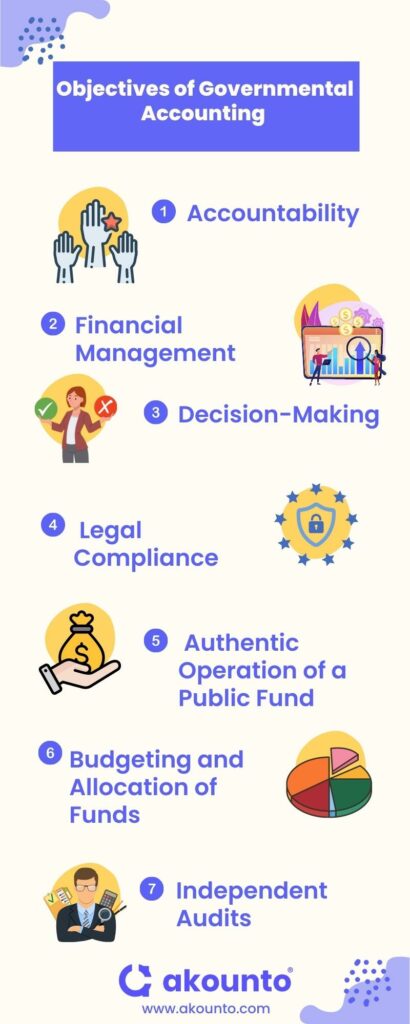What is Governmental Accounting?
Governmental accounting refers to the process of recording and the management of all financial transactions incurred by a government entity.
Government entities and agencies use public resources such as taxes and grants to provide services and goods for the citizens. These agencies serve as stewards of public money, which brings up the need for accountability, uniformity, and transparency.
What’s covered in the article
All the responsibilities of a government accountant are streamlined for these purposes, which include:
- Prepare comprehensive budgets considering the public policy priorities.
- Create and review accounting records for accuracy and reliability.
- Align financial reporting with the standards developed by the GASB
- Ensure legal compliance with all accounting and financial matters
- Oversee internal control structure and ensure the effectiveness of operations in an agency
Accounting and financial reporting are important for government entities and agencies, but for different reasons than for commercial business enterprises. The users of a government’s financial reports are the elected representatives, oversight governing bodies, and creditors.
What is Governmental Accounting Standards Board (GASB)?
Established in 1984, the Governmental Accounting Standards Board (GASB) is an independent, private-sector organization that develops and issues accounting and financial reporting standards for U.S. state and local government.
The GASB is overseen by the Financial Accounting Foundation (FAF), an independent, non-profit organization that oversees and finances both the GASB and the Financial Accounting Standards Board (FASB).
The GASB board includes seven diverse board members, including a chairman and a vice chairman. The board members are expected to deeply understand governmental accounting and finance. The FAF Board of Trustees appoints each board member for a 5-year term, and the chairman is the only full-time member of this board.
State and local government agencies are bound to comply with the generally accepted accounting principles (GAAP). The role and function of the GASB are to set standards and regulations that comply with these principles.
The ultimate purpose of the standards set by the GASB is to ensure that financial reporting is transparent and consistent from one organization to another so that the financial reports reaching the public, government officials, and investors are reliable and authentic.
Also, since government agencies use people’s taxes and revenue to provide the service, ensuring a transparent use of the funds by the officials is an important goal.
Difference between GASB and FASB?
| Differences | Governmental Accounting Standards Board (GASB) | Financial Accounting Standards Board (FASB) |
Basic Role and Function | The governmental accounting standards board (GASB) issues the GASB standards, which bind the state and local governments. | The financial accounting standards board (FASB) develops the FASB standards, which bind the public and private companies and non-profit organizations. |
| The objectives of both these boards may be almost the same: to set standards that align with the GAAP. But the applicability of these standards drastically varies. | GASB standards apply to governments that use public resources. | The FASB standards apply to companies offering products or services and generating revenue. |
| As a result of the difference in applicability, the goals are also different. | GASB standards for the government aim to ultimately provide transparent and authentic information to the U.S. public, the recipients, in this case, being the taxpayers, investors, and public officials. | FASB standards ensure the availability of accurate and reliable information to the stakeholders and the investors. |
| Entities that follow the respective GASB and FASB standards have different goals and objectives. | The goal of the GASB standards is not profit and revenue generation, rather accountability, safe decision-making, and future budgeting for public service. | Authentic financial reporting wins the trust of the board members and the stakeholders in a company and attracts more investors. And so, profit and revenue generation is the eventual goal. |
Basics
The basis of accounting determines when the economic consequences of transactions and financial events should be entered into financial statements. The GASB Statement 63 provides guidance on the timing of recording a certain financial event.
Statement 11 of the GASB briefs about the Measurement focus identifies what should be expressed in a financial report or record statement.
Measurement focus for each government entity depends upon the resources being measured and when the effects of those transactions and events are recorded. And so, the measurement focus and the basis of accounting are pretty much interrelated.
Accrual Basis of Accounting
The accrual principle of accounting requires the revenues and expenses to be recorded in the entity’s financial statements when they are incurred, regardless of when the actual cash flows for the transaction are received or paid. Funds that focus on total economic resources employ the accrual basis of accounting.
Under the GASB standards and the generally accepted accounting principles (GAAP), the accrual accounting basis applies to all government-wide financial statements and proprietary funds for the transparency of the events that increase or decrease the net positions of the fund, such as revenues, gains, and losses.
Modified Accrual Basis of Accounting
Under this basis, revenues are recognized in the accounting period in which they become measurable and available for spending. In other words, decreases or increases in the financial resources will only be recorded in a financial statement when they are expected to be paid or collected within the twelve months after the fiscal period ends.
The operating statement of a governmental fund focuses on changes in current financial resources. And so, all the governmental funds use modified accrual basis accounting, where any change in financial resources gets documented only to the extent that it reflects an imminent cash inflow or outflow.
Cash Basis of Accounting
Under the cash basis, transactions are recognized only when the actual cash transfers occur. Since these do not incorporate liabilities and assets, they rarely present the financial position of an entity.
Objectives of Governmental Accounting

1. Accountability
Governmental accounting holds public officials accountable for the powers, tasks, and public funds delegated to them by the public. An accurate display of how efficiently elected officials use public resources and authority is important for society to put its confidence in the government.
2. Financial Management
Governmental accounting is an important financial management tool, creating a basis for productivity analyses since the accountants can suggest appropriate changes in the costs and expenditures. In other words, accounting reports can determine whether a budget or revenue-to-expenditures ratio makes sense.
3. Decision-Making
Since a public institution’s main aim and goal is public service, government accounting has to eventually streamline all steps and measures in this direction. The accounting analyses and reports facilitate decision-making for better service delivery and efficiency.
4. Legal Compliance
Government accounting observes the rules and regulations set by the government accounting standards board (GASB). It ensures that the financial policies and budgeting align with the standards, and the authority and funds are used for public service and goods.
5. Authentic Operation of a Public Fund
Public funds and their smooth operation rely on authentic and reliable financial information. Government accountants create investment policies for the public funds and keep track of the expenditures and use of these public funds so that the information can be made available to its users, which is ultimately the public.
6. Budgeting and Allocation of Funds
All the expenses of a government office are segregated into budget heads with targeted objectives. This is also called fund accounting, where government allocates funds for tight control over the resources and closely monitors the inflows and outflows.
Expenditures can only be made on the budget heads approved by the government. Government accounting ensures that the expenditures do not exceed the allowed budget and that all financial transactions related to revenues and expenditures are accurately recorded.
7. Independent Audits
Government accounting also aims at carrying out audits within a fiscal year to ensure that the activities of government institutions align with the budgeted revenues and expenditures. Government accountants conduct independent audits to examine an agency’s financial accounts objectively.
To learn more about accounting, and everything around it, visit the blog. You will find articles that provide comprehensive knowledge and understanding of the different types of accounting, their application, and the relevant legal matters.











